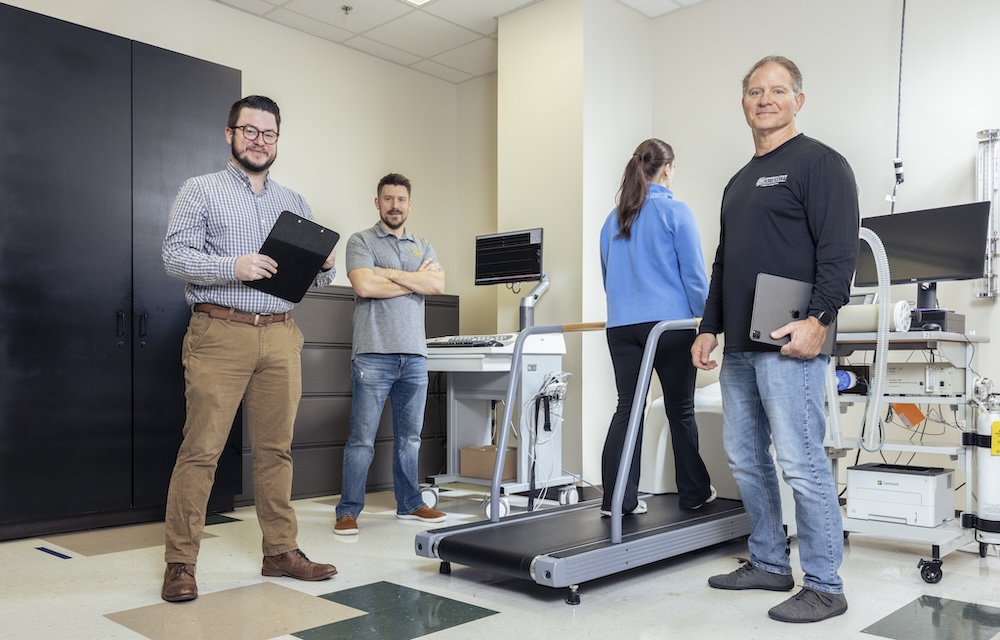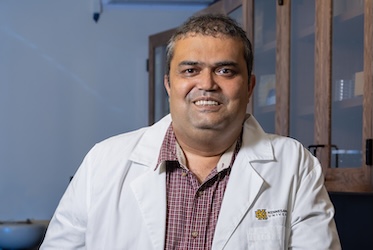
Kennesaw State researchers take big steps in obesity research with NIH grant
KENNESAW, Ga. | Nov 19, 2024

Brown, a professor of the School of Data Science & Analytics at KSU, has a personal connection to the research. After seeing a family member transform their health through a commitment to walking 10,000 steps a day, the experience influenced his desire to explore walking as an alternative to complex diets and expensive gym memberships.
“What if we could harness the power of something as straightforward as walking?” Brown said. “It’s free, accessible, and has shown promise in preliminary data.”
The research aims to confirm initial findings suggesting that increased step counts correlate with improved health indicators, such as reduced body fat and lower insulin levels. By establishing a model, the team hopes to provide healthcare professionals with a tool to recommend tailored walking goals for their patients.
“Our ultimate goal is to show that walking can be an effective means of controlling various health markers without the complications of traditional methods,” Brown said.
The study will unfold in two phases: first, tracking participants’ normal walking for eight weeks, and then prescribing daily walking goals to assess the predictive model's accuracy. Collaboration is key, with Buresh and Kliszczewicz contributing expertise in exercise science, while Brown focuses on data quality and statistical analysis.
The team is also receiving valuable support from Kennesaw State's College of Computing and Software Engineering, which is helping develop the tools needed to gather and analyze the data.
Buresh discussed what made him want to be a part of the study.
“Two-thirds of adults are overweight or obese, and many struggle with weight and cardiometabolic risk management,” Buresh said. “There are potentially millions of people who could be helped by knowing just how active they need to be to prevent weight gain, and/or to lose weight.”
A unique aspect of this study is its inclusivity. By focusing on participants across various age groups and health backgrounds, the team aims to develop a generalized model that can benefit diverse populations.
Brown emphasizes the importance of understanding how different demographic groups respond to walking as an intervention.
“Obesity rates are climbing across all demographics,” he says. “We want our model to be useful for everyone, regardless of age or health status.”
The anticipated outcomes extend beyond physical health metrics. Brown expects that walking may create mental health benefits, including improved sleep quality and reduced anxiety. While the study will primarily focus on physical indicators, the team will also consider participants’ overall well-being.
Once proven, the predictive model could revolutionize patient care. Instead of prescribing rigorous exercise routines or medications, healthcare professionals might recommend achievable daily step goals. This approach will likely resonate with patients who struggle financially.
Looking ahead, Brown envisions expanding the research to address specific populations with unique health needs.
“We want to refine our model to cater to groups that may benefit from tailored recommendations,” he said.
As they gather data and build their model, Brown and his colleagues remain hopeful that their findings will pave the way for healthier lives across the nation one step at a time.
“This research is a prime example of how simple interventions, like walking, can have an impact on public health,” Kliszczewicz said. “I’m excited to contribute to a study that could not only change the way we approach fitness but also improve the quality of life for so many people.”
– Story by Raynard Churchwell
Photos by Darnell Wilburn Jr.
Related Stories

Kennesaw State student develops AI tools to help first responders diagnose behavioral health issues

Kennesaw State students to present research at Symposium of Student Scholars

Chemistry student engaged in sustainable catalyst research through Kennesaw State's First-Year Scholars program

Kennesaw State researchers awarded Department of Energy grant to investigate materials that boost energy-efficient technologies
A leader in innovative teaching and learning, Kennesaw State University offers undergraduate, graduate, and doctoral degrees to its more than 47,000 students. Kennesaw State is a member of the University System of Georgia with 11 academic colleges. The university’s vibrant campus culture, diverse population, strong global ties, and entrepreneurial spirit draw students from throughout the country and the world. Kennesaw State is a Carnegie-designated doctoral research institution (R2), placing it among an elite group of only 8 percent of U.S. colleges and universities with an R1 or R2 status. For more information, visit kennesaw.edu.














